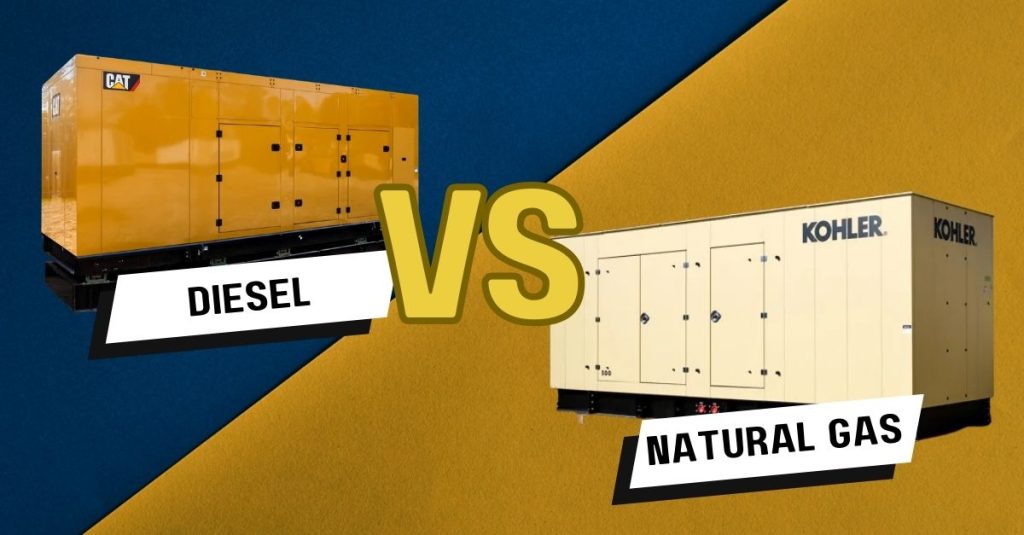Diesel vs. Natural Gas: A Head-to-Head Comparison for Your Commercial Facility

Choosing the right generator for your commercial facility is a major decision, and one of the first and most critical choices you’ll make is the fuel type. The debate between diesel and natural gas is one of the most common topics we discuss with our clients, and for good reason. Each fuel source has distinct advantages and is better suited for different applications.
Factor 1: Reliability and Fuel Storage
For mission-critical facilities where even a momentary loss of power is unacceptable, reliability is the number one priority.
- Diesel: Diesel generators are the undisputed champions of reliability for life-safety and emergency standby applications. The primary reason is their on-site fuel storage. A large, on-site diesel tank is independent of any municipal supply lines, making it immune to natural disasters or infrastructure failures that could disrupt a gas main. This is why hospitals, data centers, and emergency services overwhelmingly rely on diesel for their backup power needs.
- Natural Gas: Natural gas generators are extremely reliable, provided the gas supply is uninterrupted. They offer the convenience of a continuous fuel source without the need for on-site storage or refueling contracts. However, in the event of a widespread natural disaster like an earthquake or flood that could damage underground gas lines, their fuel source could be compromised.
Winner for Critical Standby: Diesel
Factor 2: Runtime and Operational Cost
For facilities that require long runtimes or use a generator as their primary power source, operational cost becomes a major factor.
- Diesel: Diesel fuel is typically more expensive per unit of energy than natural gas. For generators that run for hundreds or thousands of hours per year, the cost of diesel fuel will be a significant and ongoing operational expense.
- Natural Gas: Natural gas is generally a more affordable and price-stable fuel. For prime power or continuous-duty applications, such as those in the oil & gas or manufacturing sectors, a natural gas generator can offer substantial long-term savings on operational costs.
Winner for Prime Power/Long Runtimes: Natural Gas
Factor 3: Performance In Extreme Climates
Your generator must start and perform reliably, no matter the weather.
- Diesel: Diesel engines are known for their robust performance and excellent cold-weather starting capabilities, provided they are properly equipped. With standard aids like engine block heaters and glow plugs, a diesel generator can be relied upon to start in even the most frigid conditions.
- Natural Gas: While reliable, natural gas engines can sometimes be more sensitive to extreme cold. However, with appropriate cold-weather packages and proper maintenance, they can also perform well in northern climates. The primary concern remains the integrity of the fuel supply line in extreme weather events.
Winner for Cold-Weather Reliability: Diesel
Factor 4: Maintenance and Environmental Compliance
The long-term service requirements and environmental impact are important considerations.
- Diesel: Modern Tier 4 Final diesel engines are cleaner than ever before, but they require complex exhaust after-treatment systems, including Diesel Particulate Filters (DPF) and Selective Catalytic Reduction (SCR) systems that use Diesel Exhaust Fluid (DEF). These systems add complexity and cost to the maintenance schedule.
- Natural Gas: Natural gas is an inherently cleaner-burning fuel, producing significantly lower emissions of nitrogen oxides (NOx) and particulate matter. This means they often have less complex exhaust systems and can more easily meet stringent local air quality regulations.
Winner for Emissions & Simpler Maintenance: Natural Gas
Which Fuel Type is Right for You?
The best choice depends entirely on your application.
- Choose diesel if: Your primary need is emergency standby power for a mission-critical facility where failure is not an option (e.g., a hospital, data center, or emergency response center).
- Choose natural gas if: Your primary need is for prime or continuous power where long runtimes make lower operational fuel cost a priority, and you have access to a reliable municipal gas line.
Making the right choice is a crucial step in developing a reliable and cost-effective power strategy.
Need an expert opinion for your specific project? Contact the specialists at Generator Source to discuss your power needs and get a tailored recommendation.